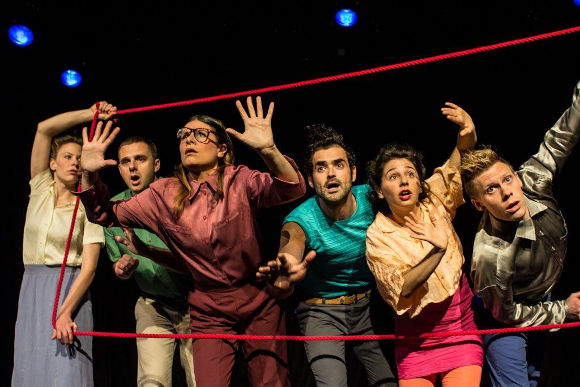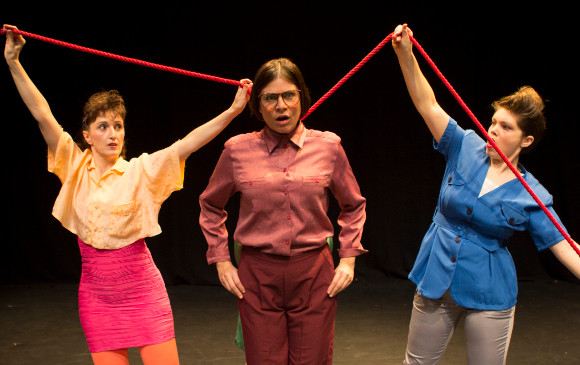Guest Blog: The UK needs to lower its barriers to foreign artists
The director of acclaimed international show ”The City and Iris” explains how UK visa issues jeopardised its current tour

I'm the artistic director of Glass-Eye Theatre and I’m exploding with joy and pride to be able to say that our original, devised play The City and Iris is currently touring the UK.
This is the culmination of a process that began in the autumn of 2009, when the company were students at LISPA (the London International School of Performing Arts). Four and a half years is a long time for a show to go from exploratory workshops to touring performances, you may say – but there’s a reason for that.
I’d draw your attention to the 'International' in LISPA’s name. Among the many London schools of performing arts, LISPA is distinctive for teaching the physical and collaborative pedagogy of Jacques Lecoq, but that’s not a distinction the school emphasises. Instead, school founder Thomas Prattki chose to put front and centre the school’s international character.
At LISPA, I had classmates from as far afield as Japan and India, Australia and Brazil. Most of the nations of Europe were represented, and of course there were plenty of Americans and even some Brits, including one proper Cockney.
The course took us on a journey, each of us discovering what we had to say, and all of us finding a way to say it to one another. For the two years of our training, language came second, and the 'poetic body' was our primary means of expressing joy, grief, desire, rage. We developed our stories and our skill at telling them, as well as our friendships and collaborative partnerships.
While at LISPA, I gathered together seven of my classmates, and we began to devise outside of school hours. The eight of us represented America, Argentina, Brazil, Britain, Norway, Spain, and Sweden – almost homogenous by LISPA’s standards, but wildly diverse anywhere else!
Over nine months, we created The City and Iris, the story of a set-in-her-ways librarian who learns to see the world anew. At every step, we had to work to create common ground: even the title evokes something different if your idea of a city stems from London or Saõ Paolo, New York or Oslo. When we found something that worked for all eight of us, we knew it would work for our audiences.

'Disaster struck'
We took The City and Iris to the Fringe in August 2010, and we built our audience, one delighted spectator at a time. By the end of the month, we had a fistful of rave reviews, and we were selling out our black box venue. We were ready for the next step: a UK tour.
But then disaster struck; a very mundane and predictable disaster. Student visas began to expire. One cast member had to return to the US, another to Argentina, and before long, only half the cast were still in the UK.
Recasting is challenging under the best of circumstances; even if the replacement actor has learned the lines and the costume fits, that actor still has to fit into an ensemble that already know the show and one another. Imagine the challenge when the actor is the role. Each member of The City and Iris created his or her place in the show, writing their own lines, defining their characters, and fitting like a puzzle piece into each made-from-scratch stage picture.
It can be done. Actors from EU and Commonwealth countries have taken the place of cast members who couldn't return to work in Britain. But we couldn't have created the show in the first place if it hadn't been for student visas.
And that’s the weird part, isn’t it? Britain is full of world-class schools for theatre that draw talent from around the globe. But, just at the moment that student friendships are becoming artistic partnerships, newly-minted graduates are banished from Britain.
Options are few. Some artists have specialised non-artistic skills that let them seek visa sponsorship through an employer – though these work visas require so many hours on the job that little time remains for creative work. Those who find love can marry and live in the UK on a spousal visa. Sometimes something as arbitrary as a grandparent born in the right country can give an artist a back door to citizenship in the EU and the right to live in Britain.
The most tantalising visa is granted for ‘exceptional talent’. We all like to think we’re pretty talented, but we’ve probably never had the measure of our talent taken by the UK Border Agency. To be endorsed as having even ‘exceptional promise’, an actor must already have a nomination for a Tony award or similar prize! This tier one visa isn’t an option for emerging artists at the start of their careers.
Emerging artists should have the opportunity to create work with the colleagues they know, trust, and have built common language. That goes for all artists, but diversity plays a special role in devised theatre. Scripted theatre lives within a country’s literary tradition, and an actor must speak that language well to perform it. While physical theatre also draws on traditional forms, without language, it’s open to everyone and becomes richer the more diverse the devisers.
Simply put, having more different perspectives in the rehearsal room means more solutions to the challenges of creating a show. Other people’s points of view help us discover our own blind spots, and even a misunderstanding can be inspirational.
From Nati Chami, The City and Iris drew the easygoing warmth of Buenos Aires; from John-Michael MacDonald the insistence on structure you might expect of Washington, DC; and from Jill Rogati the spontaneous absurdity of Boston improv. The City and Iris would be a completely different show had they not been a part of making it.
Our message is this: For a better, richer theatre scene – for a better, richer theatre – the UK needs to lower its barriers to foreign emerging artists working in Britain.
The City and Iris continues its UK tour, visiting Greenwich Theatre on 30 March. For more info, visit www.glass-eyetheatre.com












